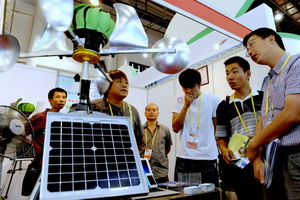Costa Rica can be trade hub for China
Updated: 2011-09-13 10:37
By Li Jiabao (China Daily)
|
|||||||||||
Central American diplomat courts investors with country's many FTAs
XIAMEN, Fujian - Chinese investors seeking a platform to enter the markets of the Americas should consider Costa Rica, given its numerous trade advantages and economic diversity, the country's ambassador to China said on Sept 9.
"The key word of Costa Rica's economy development is diversification. We will shift our efforts from the electronics industry to the high-tech, renewable- and clean-energy industries," Marco Ruiz, the Costa Rican ambassador to China, said during the 15th China International Fair for Investment and Trade in Xiamen, Fujian province, from Sept 7 to 11.
Pilar Madrigal, director of International Affairs at the Costa Rican Investment Promotion Agency, emphasized the importance of Chinese investment.
"Chinese companies can use Costa Rica as a trade platform and an investment hub to the Western Hemisphere as Minister of Commerce Chen Deming is encouraging more companies to invest abroad.
"Chinese companies can assemble goods in Costa Rica to increase their value and export to other countries through Costa Rica's FTA (free-trade agreement) with Central America and other countries," she said.
Costa Rica is the only Central American country to have an FTA with China. Costa Rica's eight FTAs regulate trade with 13 partners and cover 64.1 percent of the country's exports and 64.1 percent of its total imports.
Statistics from the General Administration of Customs of China show that trade volume between China and Costa Rica reached $3.8 billion in 2010, up 19.2 percent year-on-year. China's exports to Costa Rica reached $690 million last year while imports totaled $3.11 billion.
The electronics industry has been the leading sector in Costa Rica in the past decades and the country is a major supplier of electronics.
Since 2000, Costa Rican exports to China, which include computer components and accessories, electrical plugs and agricultural products, increased approximately 70 percent annually.
The FTA between Costa Rica and China came into effect on Aug 1. More than 90 percent of bilateral trade goods will eventually be tariff-free.
"China-Costa Rica trade is expected to increase more than 5 percent each year despite a global reduction in trade, especially in the United States and European Union. But in Asia, specifically China, trade is growing very fast," Ruiz said.
So far, Costa Rica has established FTAs with Singapore and China and is evaluating the possibility of an FTA with South Korea.
Pilar said that the FTA with China "has built a highway through the ocean, allowing Chinese companies, investors, tourists to go with confidence".
However, challenges in areas including mutual understanding and cooperation may effect China's investment in Costa Rica.
"My suggestion for Chinese investors is that it is difficult to go abroad alone. It is much better to find partners in Costa Rica because they understand the language, customs and traditions. It's the same for Costa Rican companies investing in China," Ruiz said.
Related Stories
China-Costa Rica FTA takes effect 2011-08-01 14:03
Costa Rica remembers fallen colleague at Copa 2011-07-09 08:01
Costa Rica's birth rate drops 5% due to economic crisis 2011-04-19 11:10
- Aug steel output dips, Baosteel ups Oct prices
- Nissan gets OK to sell electric car Leaf in China
- Banks warned of risks in commercial property
- Better investment environment sought
- Chinese tire exports decline after WTO ruling
- Tasty profit wrapped in moon cakes
- Sept 11 shapes rise of emerging nations
- Chinese yuan appreciation 'will remain gradual'













